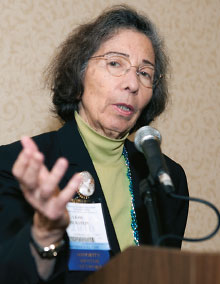Leah Dickstein, APA Leader and Mentor to Many, Dies
Abstract
Dickstein pioneered the field of medical student and resident well-being nearly 30 years before physician burnout became a prominent issue and focus of attention.

Leah Dickstein, M.D., who died December 16, was vice president of APA from 1991 to 1993.
Leah Dickstein, M.D., a former APA vice president, mentor to countless psychiatrists, and pioneer in physician well-being, died December 16, 2019. She was 85.
She was vice president of APA for the 1991-1993 term and chair of the Scientific Program Committee in 1995 and 1996. Dickstein was also a past president of the American Medical Women’s Association and a founder in 1983, along with Alexandra Symonds, M.D., and others, of the Association of Women Psychiatrists.
Dickstein helped to pioneer the field of physician well-being long before physician burnout and suicide made it a buzz phrase. In 1981 at the University of Louisville School of Medicine, where she worked her entire career, she initiated the Health Awareness Workshop Program for medical students. The program, based on her own experience attending medical school while raising a family, was designed to help medical students attend to their own well-being while maintaining healthy personal relationships.
An article about Dickstein as part of the National Institutes of Health’s online exhibit about women in medicine (“Changing the Face of Medicine”), states: “The [Health Awareness] program addresses everything from study skills and time management to exercise and nutrition and community resources and mentoring. Many of the presentations and materials are authored by senior medical students. The message is that students must take care of their own physical and mental health before they can learn to take care of others. As director, Dr. Dickstein helps teach medical students and their partners how to cope with the demands of medical school.”
APA CEO and Medical Director Saul Levin, M.D., M.P.A., remarked that many psychiatrists who attend APA’s Annual Meeting know Dickstein as a co-founder of the popular “Children of Psychiatrists” session that was begun in 1998 with former APA President Michelle Riba, M.D. “That session was close to her heart and reflected her own values as a wife, mother, and psychiatrist,” said Levin. “In 1966, after six years working as a sixth-grade teacher to support her medical student husband, she entered medical school herself, one of only six women in her class, and raised three sons and looked out for the welfare of countless others.”
Dickstein was associate dean for student affairs at the university and later associate dean for faculty and student advocacy until her retirement in 2002. She was also national chair of the Association of American Medical College’s Group on Student Affairs from 1998 to 1999. Under her leadership, the group published “Appropriate Treatment in Medicine: A Compendium on Medical Student Mistreatment.” The resource was developed in response to a new accreditation standard of the Liaison Committee on Medical Education (LCME), which called on medical schools to “define the standards of conduct in the teacher learner [and] develop and widely promulgate written procedures that allow medical students to report violations of these standards—such as incidents of harassment or abuse—without fear of retaliation.”
Colleagues and friends recall Dickstein as a “mover and shaker” who was nonetheless content to make a difference outside of the spotlight. “My colleague and dear friend, Leah, lived the Hebrew principle of tikkun olam,” past APA President Carolyn Robinowitz, M.D., told Psychiatric News. (Tikkun olam, pronounced tea koon oh lam, means “to repair the world.”) “Her tremendous love, generosity, caring, and compassion for family, colleagues, students, and patients was mixed with her willingness to address injustice and speak truth to power. A creative initiator, she was willing to forego the limelight to get the job done, even if others received the applause.”
Robinowitz added, “She focused on physician wellness before that was an accepted or well-known term. While particularly noted for her superb mentoring of mainly younger women, she cared for male colleagues similarly, encouraging all to be people of good conscience.”
Nada Stotland, M.D., also a past APA president, agreed. “I am among the hundreds of medical students, residents, and colleagues who owe our successes in large part to the steadfast, selfless support of Leah Dickstein,” Stotland said. “Leah always believed that you were more accomplished than you realized and that you were qualified to accomplish more than you’d imagined.”
Psychiatrist and past APA trustee Mary Kay Smith, M.D., said Dickstein’s legacy is almost impossible to measure, so numerous and far flung are the psychiatrists and young physicians she mentored. “She had a massive impact on generations of leaders at APA including future leaders whose names we don’t know yet,” Smith said in an interview.
Smith said Dickstein made a conscious decision to invest in others, rather than in her own advancement, and she echoed Robinowitz in saying the former APA vice president had a knack for doing the hard work in the shadows while others may have gotten the acclaim.
Smith recalled a “visual” that seemed representative: Dickstein often wore several pins on her lapel, in honor of various causes she championed; but on the underside of her lapel, she might show to friends, were the pins representing the causes closest to her heart. “Your most passionate commitments are not always obvious to the world but are closest to your heart—that was Leah.” ■
The “Changing the Face of Medicine” article about Leah Dickstein is posted here.
This year’s “Children of Psychiatrists” session will be held at APA’s 2020 Annual Meeting on Sunday, April 26, from 3 p.m. to 4:30 p.m.



